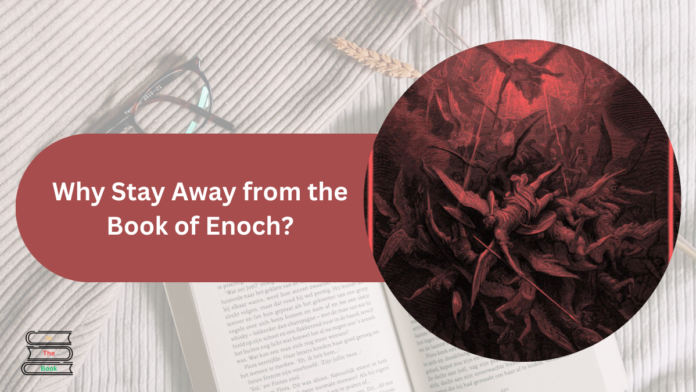The Book of Enoch is an ancient text that has fascinated many but also sparked considerable controversy. Understanding why some advise staying away from it involves delving into its complex history, content, and the theological implications it carries.
This article combines insights on why stay away from the Book of Enoch, presenting eight key reasons to help readers make an informed decision.
Contents
- What is the controversy behind this book?
- Why Stay Away from the Book of Enoch?
- What is the content in this book?
- The role of non-canonical texts
- What is the impact of the religious thoughts?
- How to compare canonical and non-canonical texts?
- Conclusion
- Some Questions
- Why is the Book of Enoch not part of the canonical scriptures?
- What are the main themes of the Book of Enoch?
- What should readers consider before engaging with the Book of Enoch?
- What are the benefits of reading non-canonical texts like the Book of Enoch?
- How should one approach reading the Book of Enoch if they choose to do so?
What is the controversy behind this book?
The Book of Enoch, attributed to Enoch, the great-grandfather of Noah, is an ancient Jewish text that provides detailed accounts of the supernatural and apocalyptic visions. Despite its intriguing content, it is not part of the canonical scriptures for Judaism and most branches of Christianity.
This exclusion raises questions about its authenticity and relevance, leading to debates among scholars and religious leaders.
Why Stay Away from the Book of Enoch?
Many advise against reading the Book of Enoch because it is not part of the official texts of Judaism or Christianity. These official scriptures are considered divinely inspired, and the exclusion of the Book of Enoch suggests that religious scholars and leaders throughout history did not find it divinely inspired.
This raises doubts about its legitimacy and reliability as a spiritual guide. The authorship and origins of the Book of Enoch are unclear. Although it is attributed to Enoch, there is no concrete evidence to support this claim.
Over centuries, the text has likely been edited and expanded, making it difficult to determine its original form. This questionable authenticity makes it a less reliable source for theological and spiritual guidance.
The Book of Enoch presents ideas and stories that differ significantly from those in official scriptures. These differences can create confusion for those who strictly follow traditional religious teachings.
For example, the book’s detailed accounts of fallen angels and their offspring, the Nephilim, are not elaborated upon in the official Bible, which can lead to conflicting beliefs.
The Book of Enoch is known for its complex and mystical content, dealing with themes and apocalyptic visions. This complexity can be challenging to understand and may not be suitable for those seeking straightforward religious instruction.
The text’s detailed descriptions of supernatural events and entities require careful interpretation, which can be overwhelming for some readers.
Given its complexity and non-official status, the Book of Enoch is prone to misinterpretation. Readers without a thorough understanding of the historical and theological context might draw incorrect or harmful conclusions.
This risk of misinterpretation is a significant reason why some advise against engaging with the text. The Book of Enoch contains stories and teachings that do not align with accepted religious teachings. For example, it elaborates extensively on the fall of the angels and the giants, which are not detailed in the official Bible.
These discrepancies can lead to doctrinal confusion, making it difficult for readers to reconcile the text with their existing beliefs. The Book of Enoch has not been widely studied or supported by mainstream religious scholars. This lack of scholarly attention further questions its reliability and relevance.
Without substantial academic backing, the text remains on the fringes of theological study, making it a less credible source of spiritual insight. Engaging with non-official texts can sometimes lead to spiritual misguidance. Readers might become fixated on ideas that are not aligned with core religious teachings, which can divert them from their spiritual path.
This potential for misguidance is a crucial consideration for those debating whether to explore the Book of Enoch.
What is the content in this book?
The Book of Enoch is divided into several sections, each containing unique narratives and themes. These sections include the Book of Watchers, the Book of Parables, the Astronomical Book, the Dream Visions, and the Epistle of Enoch.
Each section offers different insights and stories, some of which are deeply mystical and apocalyptic.
- The Book of Watchers: This section describes the fall of the angels, their interactions with humans, and the subsequent birth of the Nephilim, or giants. This narrative expands on a brief mention in the canonical Bible but adds significant detail and supernatural elements.
- The Book of Parables: Here, Enoch shares visions and parables that focus on the coming judgment and the fate of the righteous and the wicked. These parables are often seen as prophetic and contain vivid imagery.
- The Astronomical Book: This section provides detailed descriptions of the movements of the heavenly bodies and the cosmos. It reflects a unique blend of astronomy and theology, which can be difficult to interpret.
- The Dream Visions: Enoch recounts a series of symbolic dreams that depict the history of the world and the future of humanity. These visions are rich in symbolism and require careful interpretation.
- The Epistle of Enoch: This final section contains exhortations, blessings, and curses, focusing on moral teachings and the consequences of sin and righteousness.
The role of non-canonical texts
Non-canonical texts like the Book of Enoch can offer valuable insights and perspectives on ancient religious beliefs and practices. However, their non-canonical status means they have not been universally accepted as divinely inspired or authoritative, which can limit their use in doctrinal teaching and spiritual guidance.
For those interested in the historical and cultural context of ancient religious texts, the Book of Enoch can be a fascinating read. However, for those seeking clear and reliable spiritual instruction, its non-canonical status and controversial content may make it less suitable.
What is the impact of the religious thoughts?
While not widely accepted in mainstream religious traditions, the Book of Enoch has influenced certain theological ideas, particularly concerning angelology and eschatology.
Some religious scholars and enthusiasts appreciate its detailed accounts of angels, demons, and apocalyptic visions, viewing it as a complementary text that enriches their understanding of ancient beliefs.
However, this appreciation is not universal, and many religious authorities continue to view it with skepticism.
How to compare canonical and non-canonical texts?
Comparing canonical and non-canonical texts can help readers understand the criteria used to determine the inclusion of certain books in the canon. Canonical texts are typically recognized for their consistent theological themes, historical reliability, and divine inspiration.
Non-canonical texts like the Book of Enoch may need to have these qualities, leading to their exclusion from the canon. This comparison highlights the importance of discernment when engaging with religious texts, particularly those that fall outside the accepted canon.
Conclusion
The Book of Enoch is a fascinating text with historical and theological significance, but it is essential to approach it with caution. Its non-canonical status, complex content, and potential for misinterpretation make it a challenging and potentially misleading read.
Understanding the reasons to stay away from the Book of Enoch can help you make an informed decision about whether to explore its contents further.
Some Questions
Why is the Book of Enoch not part of the canonical scriptures?
The Book of Enoch is not included in the canonical scriptures of most major religious traditions due to its questionable authenticity and theological differences from accepted doctrines.
What are the main themes of the Book of Enoch?
The Book of Enoch covers themes such as the fall of the angels, apocalyptic visions, and the movements of heavenly bodies. It also includes moral teachings and prophetic parables.
What should readers consider before engaging with the Book of Enoch?
Readers should consider its non-canonical status, the potential for misinterpretation, and its complex content. It is advisable to approach it with caution and seek guidance from knowledgeable sources.
What are the benefits of reading non-canonical texts like the Book of Enoch?
Non-canonical texts can provide additional insights into ancient religious beliefs and practices, offering a broader perspective on historical theology and spirituality.
How should one approach reading the Book of Enoch if they choose to do so?
If you choose to read the Book of Enoch, do so with a critical mind and an awareness of its non-canonical status. Cross-referencing with canonical texts and seeking insights from reputable scholars can help ensure a balanced understanding.
Read More:
- The Real Reason Invoices Go Unpaid — And How Collection Automation Can Fix It
- Best Places to Buy Diamonds and Engagement Rings Online
- Building Focus and Strategy Through Interactive Digital Experiences
- How Students’ Reading Interests Influence Their Motivation and Performance in Writing Assignments
- The Damages Resulting from the Use of Suboxone

Chandler is an avid automobile enthusiast who is passionate about all things on wheels. From the latest car models to classic vintage rides, I love exploring the automotive world’s intricate details and engineering marvels. With years of experience in test-driving, reviewing, and analyzing cars, I provide readers with comprehensive insights and honest opinions.



























